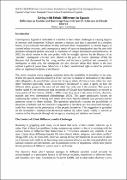| dc.contributor.author | Ssentongo, Jimmy Spire | |
| dc.date.accessioned | 2018-07-25T09:25:59Z | |
| dc.date.available | 2018-07-25T09:25:59Z | |
| dc.date.issued | 2014-01 | |
| dc.identifier.uri | http://hdl.handle.net/20.500.12280/531 | |
| dc.description.abstract | Contemporary Uganda is embroiled in a number of inter-ethnic challenges at varying degrees
of intensity and complexity. Kibaale presents a curious case that is grounded in a complex
history of pre-colonial inter-ethnic rivalry; colonial ethnic manipulation; a colonial legacy of
strained ethnic relations; and contemporary trends of massive immigration into the area with
attendant immigrant-phobia catalysed by memories of foreign domination and humiliation. In
2002, the ethnic tension in the area peaked with the outright rejection by the Banyoro of an
‘outsider’ (immigrant) who had been elected to the post of District chairman. While the
Banyoro feel threatened by the rising number and influence (political and economic) of
immigrants in their area, the immigrants are also insecure about their future in the area
without a political power base. Moreover, it is their constitutional right to stand for political
office as legitimate residents of the district.
The above situation raises nagging questions about the possibility of pluralism in the area.
Within the painful memories (history) of the Banyoro in relation to domination by the ethnic
other (Baganda), do possibilities remain for living in ethnic difference even when the ‘new
other’ becomes politically or/and economically influential? It raises a query on how the
different ethnic groups in the area feel and what they make out of the situation. This query is
further raised by the observation that the people of Kibaale have harmoniously co-existed at
some points of their history (1960s – 2000) when they went to the same schools, churches,
markets and even intermarried (Schelnberger 2005). This paper particularly focuses on
explaining the realities of living with ethnic differences that the Kibaale case presents and the
questions raised by those realities. The questions specifically concern the possibilities of
pluralism in Kibaale and the conclusive suggestion is that these are best answered through a
study that focuses on the perceptions of the people themselves. This suggestion is grounded
on the researcher’s constructivist theoretical outlook by which social reality is viewed as
constructed by the people through whose agency meaning and relations are formed | en_US |
| dc.language.iso | en | en_US |
| dc.publisher | Cultural Foundation of Uganda | en_US |
| dc.relation.ispartofseries | Managing Diversity: Uganda's Experience; | |
| dc.subject | Ethinic differences | en_US |
| dc.subject | Kibaale distrcit | en_US |
| dc.subject | Colonial ethnic manipulation | en_US |
| dc.subject | Pre-colonial inter-ethnic rivalry | en_US |
| dc.subject | Strained ethnic relations | en_US |
| dc.title | Living with Ethnic Difference in Uganda: Reflections on Realities and Knowledge Gaps with Specific Reference to Kibaale District | en_US |
| dc.type | Book chapter | en_US |


